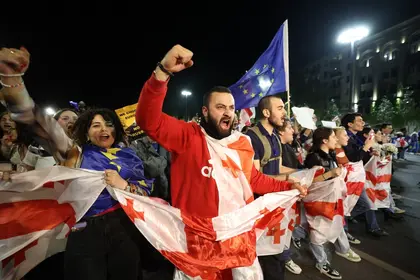Georgian youths have dominated a week of street protests against plans for a "foreign influence" law and are increasingly vocal about affinity for the European Union and Western values.
For the fifth straight night Friday, hundreds of young protesters marched in the capital Tbilisi to make their voices heard.
JOIN US ON TELEGRAM
Follow our coverage of the war on the @Kyivpost_official.
After one speaker asked them through a loudspeaker "Where are we heading?" they waved EU flags and set off a chorus of vuvuzelas, chanting "To Europe!"
Georgia has been rocked by street protests since Monday against the ruling Georgian Dream party's plan to a "foreign influence" law resembling Russian legislation used to silence dissent.
The initiative has sparked outrage in Georgia and concern in the West, with Brussels warning it would undermine the country's long-standing bid for EU membership.
Thousands rallied outside parliament against the bill this week, and fresh mass protests are planned for early May, when lawmakers give the bill its second reading.
And out of these protests, a youth movement has emerged that is passionately pro-European and uncompromising when it comes to defending Georgia's fragile democracy.
- 'Who else but us?' -
Politicians and civil activists are deliberating on how to force authorities to abandon the bill.
"We will not back down until the government scraps that Russian law," said one 15-year-old Lika Naskidashvili.
"Check us out, is there any power that could stop us?" the teen protestor said.

Georgia’s Accession Process to the Bloc ‘de Facto’ Halted, EU Leaders Warn
Her friend Giorgi Toroshelidze -- with the EU flag painted on his forehead -- nodded, saying: "Who else but us? This is about our future, it's about Georgia's fate!
"Not only will we make them repeal this law, we won't tolerate a pro-Russian government ruling in Georgia any longer."
A former Soviet republic, Georgia has for years sought to deepen relations with the West.
Opinion polls suggest 80 percent of the population backs EU and NATO membership -- that twin aspiration is even enshrined in the country's constitution.
But the current ruling party, Georgian Dream, is accused of trying to steer the Black Sea nation toward closer ties with Russia.
The party was forced to drop a similar bill last year, following mass protests that saw police use water cannon and tear gas against demonstrators.
But in a surprise move ahead of October's crucial parliamentary elections, seen as a key democratic test for Georgia, the party re-introduced the bill. They argued it would help boost transparency in the foreign funding of NGOs.
Protester Levan Abramia, 16, was unconvinced.
"Who falls for their fake discourses? Our government is just doing that at Russia's bidding, they are (Russian President Vladimir) Putin's puppets.
"But where are we heading?" he shouted, and the crowd exploded: "To Europe!"
Drivers of passing cars sounded their horns.
- 'Concerning development' -
The EU granted Georgia official candidate status in December.
But Tbilisi has to reform its judicial and electoral systems, reduce political polarization, improve press freedom and curtail the power of oligarchs if it wants to make further progress, Brussels warned.
Tbilisi has to show tangible progress on those demands by December if membership talks are to be formally launched.
But after parliament approved the controversial bill's first reading on Wednesday –- in a vote boycotted by opposition parties -- Brussels issued a clear warning.
Wednesday's vote was a "very concerning development", European Union foreign policy chief Josep Borrell and enlargement commissioner Oliver Varhelyi said in a joint statement.
"Final adoption of this legislation would negatively impact Georgia's progress on its EU path," they said, adding: "This law is not in line with EU core norms and values."
Once seen as leading the democratic transformation of ex-Soviet countries, Georgia has in recent years been criticized for perceived democratic backsliding.
You can also highlight the text and press Ctrl + Enter






